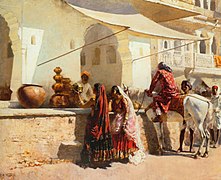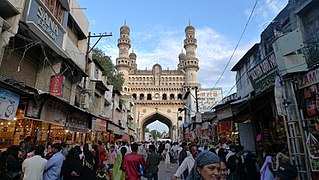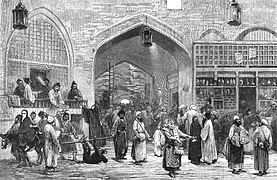List of bazaars and souks
This is a list of bazaars and souqs.
Bazaars
Albania and Kosovo
In Albania and Kosovo, two distinct types of bazaar can be found; Bedesten (also known as bezistan, bezisten, bedesten) which refers to a covered bazaar and an open bazaar.
- Albania
- New Bazaar, Tirana
- The Old Bazaar of Korçë
- Krujë Bazaar
- Kosovo
- Bazaar of Peja
- The Old Bazaar of Gjakova
- Bazaar of Pristina (defunct)
Afghanistan
- Shah Bazaar, Kandahar
- Shor Bazaar, Kabul
- Grand Bazaar, Herat
- Mazari Bazaar, Mazari Sharif
- Olander Bazaar, Yllib, Kandahar
-
City of Kandahar, its principal bazaar and citadel, taken from the Nakkara Khauna from Lieutenant James Rattray, Afghanistan
-
An Afghan elder sits outside his store at the Anaba bazaar in Panjshir, Afghanistan
-
Ka Foroshi, the bird market in Kabul
Australia
- Ingleburn Bazaar (held annually during the Ingleburn Festival)
- Khan Bazar, Khankendi
- Kolkhoz (or Merkezi) Bazaar (Kolkhoz (Central) Bazaar), Sumgait
- Kohna Bazaar (Old Bazaar), Ganja
- Ortulu Bazar, Shamakhi
- Sharq Bazaar (East Bazaar), Baku
- Sharq Bazaar (East Bazaar), Sumgait
- Pasaj Bazary, Aghdam
- Teze Bazar (New Bazaar), Baku
- 8 Kilometre Bazaar, Baku
- Yashil Bazar (Green Bazaar), Baku
- Yeni Bazar, Shaki, Azerbaijan
- Zanbil Bazar (Basket Bazaar), Nakhchivan
-
Big Bazaar, Lankaran, Azerbaijan
Bangladesh
In Bangladesh, a Haat bazaar (also known as hat or haat or hatt) refers to a regular produce market, typically held once or twice per week.[1]
- Amin Bazaar, Dhaka
- Bhairab Bazaar, Kishoreganj District
- Badshahi Chawk Bazaar (also known as Chowk Bazaar), Dhaka
- Dasherjangal Bazaar, Shariatpur District
- Jalchatra Bazaar, Bangladesh
- Kachukhet Bazaar, Dhaka
- Karwan Bazaar, Dhaka
- Kazir Dewri, Chittagong
- New Market Kacha Bazaar, Dhaka
- Malibagh Bazaar, Dhaka
- Banani Bazaar, Dhaka
- Khilkhet Kacha Bazaar, Dhaka
- Mohakhali Bazaar, Dhaka
- Moulvibazar, Moulvibazar Sadar Upazila, Moulvibazar District
- Shanti Nagar Bazaar, Dhaka
- BCC Road, Thatari Bazaar; Wari- Dhaka
-
Dhaka Town Chowk, 1904
Belarus
Bosnia and Herzegovina
- Baščaršija, Sarajevo
- Kujundžiluk, Mostar
China
- Grand Bazaar, Urumuqi, Xinjiang
- Monday Bazaar, Upal, Xinjiang
- Sunday Bazaar, Kashgar, Xinjiang
Egypt
-
Two Egyptian women shopping at a market next to the Al-Ghouri Complex in Cairo, Egypt.
-
Khan el khalili, Cairo (interior)
-
Khan al-khalili, bab al-qutn (gate)
-
Shop of a Turkish Merchant in Kha'n El-Khalee'lee, 1836
-
Arabic Window and Native Bazaar, Cairo
Hong Kong
India
In India, and also Pakistan, a town or city's main market is known as a Saddar Bazaar.
These are mutually agreed border bazaars and haats of India on borders of India with its neighbours.
- Paltan Bazaar Assam
- Pan Bazaar Guwahati, Assam
- Uzan Bazaar Guwahati, Assam
- Gandhi Bazaar, Bangalore
Chennai, Tamil Nadu
- Burma Bazaar, Chennai
- Pondy Bazaar, Chennai
- In Delhi
- Arul Bazar, Delhi
- Chandni Chowk, Delhi
- Chawri Bazaar, Delhi (wholesale market)
- Chhota Bazaar Shahdara, Delhi
- Dilli Haat, Delhi – A Haat is a regular open-air produce market
- Khan Market, Delhi
- Meena Bazaar, Delhi
- Palika Bazaar, Delhi
- Sadar Bazaar, Delhi
- Urdu Bazaar (Delhi)
- In National Capital Region (NCR)
- Begum Bazar, Hyderabad
- Chatta Bazaar, Hyderabad, India
- Laad Bazaar, Hyderabad, India
- Shahran Bazaar, Hyderabad
- Sultan Bazar, Hyderabad
- Rythu bazaar, Telangana
- Sarafa Bazaar, Indore, India
Kerala, Keralam
- Chala Bazaar, Thiruvananthapuram, Kerala
- Rice Bazaar Thrissur, Kerala
- Burra Bazar, Kolkata
- Bowbazar, Kolkata
- Tiretta Bazaar, Kolkata
- Bhendi Bazaar Mumbai
- Bhindi Bazaar, South Mumbai
- Chor Bazaar, Mumbai
- Zaveri Bazaar, Mumbai
- Bari Bazaar, Munger
- Bhubaneswar Bazaar, Unit-1 BadaMarket, Bhubaneswar
- Gole Bazaar, Sambalpur
- Choudhury Bazaar, Cuttack
- Nua Bazaar, Cuttack
- Chaura Bazaar Ludhiana, Punjab
- Chess Bazaar, Mohali, Punjab
- Sadar Bazaar, Rajkot
- Aminabad Bazaar Luknow, Uttar Pradesh
- Bada Bazaar, Jhansi, Uttar Pradesh
- Hooseinabad Bazaar, Lucknow, Uttar Pradesh
- Lalganja Bazaar, Uttar Pradesh
- Meena Bazaar Lucknow, Uttar Pradesh
- Purani Najhai, Jhansi, Uttar Pradesh
- Sabzi Bazaar, Shihura Khurd Kalan, Uttar Pradesh
- Sadar Bazaar, Agra, Uttar Pradesh
- Sarafa Bazaar, Jhansi, Uttar Pradesh
- Godowlia Market, Varanasi, Uttar Pradesh
- Vishvanath Gali Market, Varanasi, Uttar Pradesh
-
Women purchasing copper utensils in a bazaar by Edwin Lord Weeks, late 19th century
-
Almora Bazaar, Uttarakhand, c1860
-
Laad Bazaar near Charminar, Hyderabad, India
-
Paltan Bazaar, Assam, India
-
Cheh Tuti Chowk or Six Tuti Chowk, Main Bazaar, Paharganj
-
Gateway to Hooseinabad Bazaar, Lucknow, c. 1863
-
Bazaar along Kalbadevie Road, Bombay (now Mumbai), 1890
-
Antiques and old posters at Chor Market in Mumbai
Indonesia
Iran
- Ardabil Bazaar
- Bazaar of Borujerd
- Bazaar of Tabriz in Tabriz – an historic site that originally developed along the ancient silk routes; listed as a World Heritage Site[2]
- Isfahan Bazaar in Isfahan – historic site which dates to Safavid era.[3]
- Behjat Abad Market, Tehran
- Caravanserai of Sa'd al-Saltaneh Qazvin, Iran
- Ganjali Khan Complex, Kerman, Iran
- Kashan Bazaar in Kashan
- Khan Bazaar, Yazd
- Kerman Bazaar, Kerman
- Kermanshah Bazaar, Kermanshah
- Kohneh Bazaar, Abadeh
- Qeysarie Bazaar Bazaar, Isfahan
- Tajrish, Shemiranat County, Tehran Province, Iran
- Tehran Bazaar, Tehran
- Sanandaj Bazaar, Sanandaj
- Saraye Moshir, Shiraz, Southern Iran
- Vakil Bazaar, Shiraz
- Amol Bazaar in Amol
-
Mozaffarieh: An alley in Tabriz Bazaar devoted to carpet selling
-
Bazaar in old Tehran, 1873
-
Vakil Bazaar from Jane Dieulafoy, Perzië, Chaldea en Susiane, 1881
-
Vakil Bazaar
-
Bazar of Kashan by Pascal Coste, 1840
-
Bazaar ofe Kashan, Kashan, Iran
-
Caravanserai of Sa'd al-Saltaneh
-
Grand Bazaar, Tehran, Iran
Iraq
A Qaysari Bazaar is a type of covered bazaar typical of Iraq.
- Souk al-Bazzazeen, Baghdad
- Souk al-Safafeer, Baghdad
- Souk al-Sarai, Baghdad
Israel and Palestine
- Old City of Jerusalem – there are many Bazaars in the Christian, Muslim and Jewish Quarters. the Armenian one does not include Bazaar of its own.
- Mahane Yehuda, Central Jerusalem
- City of Acre, Israel
- Old City of Nazareth Bazaar
Kazakhstan
- Kök Bazaar, Almaty
- Central Bazaar, Aktobe
- Baraholka, Almaty
Kuwait
- Souq Almubarikiyya * Souq Avenues
Kyrgyzstan
Lebanon
After sustaining irreparable damage during the country's civil war, Beirut's ancient souks have been completely modernised and rebuilt while maintaining the original ancient Greek street grid, major landmarks and street names.
- Bazaars and Souks of Old Cities of Tripoli – The ancient city of Tripoli has two separate old towns, both of which have large, well preserved souks, bazaars and khans of various specialties.
- Souk of Old Quarter of Byblos
- Souk of Old Quarter of Jounieh
- Souk of Old Quarter of Aley
- Bazaars and Souks of Old City of Sidon – The ancient, Southern city of Sidon has a large and well preserved old town that is divided into the Muslim, Christian and Jewish quarters, each of which contains souks, bazaars and khans of various specialties.
- Souk of Old City of Tyre
- Beirut Souks
Malaysia
- Bukit Beruang Bazaar, Malacca
- Bazar Bukakbonet Gelang Patah, Johor Bahru
Nepal
- Asan, Kathmandu ceremonial bazaar and square
- Bishal Bazaar, Pokhara
- Gaushala Bazar, Mahottari District
- Khaireni, Gulmi District
- Namche Bazaar, Namche
- Purano Bazaar, KTM
- Naya Bazaar, KTM
- Newari bazaar
- Shyauli Bazaar Gandaki, Nepal
North Macedonia
In the Balkans, the term, 'Bedesten' is used to describe a covered market or bazaar.
-
The Bazaar
-
Belgrade street
-
The Bazaar
-
Street stairs
-
A street
-
A street
-
The entrance to the Bezisten
-
The Bezisten
-
The Bazaar by night
Norway
- Oslo Bazaars – a protected site
Pakistan
Hyderabad, Pakistan
- Shahi Bazaar, Hyderabad
- Sarafa Bazaar, Hyderabad
- Saddar (Hyderabad) in Pakistan
- Resham Bazaar, Hyderabad
- Saddar (Hyderabad) in Pakistan
Karachi
- Bohri Bazaar, Karachi
- Jodia Bazaar, Karachi
- Saddar in Karachi
- Sarafa Bazaar, Karachi
- Meena Bazaar, Karachi
- Soldier Bazaar, Karachi
- Tariq Road Bazaar, Karachi
- Urdu Bazaar, Karachi
- Zainab Market, Karachi
Kashmir
Lahore
- Anarkali Bazaar, Lahore
- Mochi Gate Bazaars, Walled City of Lahore
- Naulakha Bazaar, Lahore
- Naranki Bazaar[4]
- Raja Bazaar
- Urdu Bazaar, Lahore
Peshawar
Punjab, Pakistan
- Chakdina Bazaar, Kharian Tehsil of Gujrat District, Punjab, Pakistan
- Chotaka Bazaar, Multan District
- Chowk Bazaar, Multan
- Moti Bazaar, Rawalpindi, Punjab
- Multani Bazaar, Multan District
- Rail Bazaar, Multan District
- Raja Bazaar, Rawalpindi
- Rasheed Shah Bazaar, Multan District
- Saddar in Karachi (Saddar bazaar refers to a main or central bazaar)
- Saddar, Rawalpindi
- Sarafa Bazaar, Rawalpindi
- Rawalpindi bazaars
- Urdu Bazaar, Rawalpindi, Punjab
- Urdu Bazaar, Multan
Rajdhani
Sargodha
-
Qissa Khwani Bazaar, Peshawar, Pakistan
-
Bazaar, Karachi, Pakistan
-
Rawalpindi Bazaar, Rawalpindi, Punjab
Serbia
- New Bazar, Novi Pazar
South Africa
- Marabastad, Pretoria also known as Asiatic Bazaar, Pretoria, South Africa
Sri Lanka
- Madawala Bazaar
Syria
- Al-Buzuriyah Souq in Damascus
- Al-Hamidiyah Souq in Damascus
- Souq Atwail in Damascus
- Souq Al Buzria in Damascus
- Mathaf Al Sulimani in Damascus
- Midhat Pasha Souq in Damascus
- Souq Al-Attareen (Perfumers' Souq) in Aleppo
- Souq Khan Al-Nahhaseen (Coopery Souq) in Aleppo
- Souq Al-Haddadeen (Blacksmiths' Souq) in Aleppo
- Suq Al-Saboun (Soap Souq) in Aleppo
- Suq Al-Atiq (the Old Souq) in Aleppo
- Al-Suweiqa (Suweiqa means "small souq" in Arabic) in Aleppo
- Suq Al-Hokedun (Hokedun means "spiritual house" in Armenian) in Aleppo
-
The Fruit Bazaar, Damascus, painting by Margaret Thomas and reproduced in John E. Kelman, From Damascus to Palmyra, 1908
-
The Silk Bazaar, Damascus – Australians buying goods, 1918
-
Entrance to the Bazaar, Gaza
-
The Bazaar of El Harish, 1881
Tanzania
- Darajani Market also known as Darajani Bazaar
Tunisia
Turkey
In Turkey, the term 'bazaars' is used in the English sense, to refer to a covered market place. In Turkish the term for bazaar is "çarşı."
- Arasta Bazaar, Istanbul
- Eminönü Istanbul
- Grand Bazaar, Istanbul
- Spice Bazaar, Istanbul
- Kemeraltı, İzmir
- Mahmutpaşa Bazaar, Istanbul
- Silk Bazaar, Bursa
- Uzun Carsi (The Long Bazaar), Bursa
- Acik Carsi (The Openair Bazaar), Bursa
-
Kemeraltı (bazaar district), İzmir, Turkey
-
Arasta Bazaar, Istanbul
-
Grand Bazaar, Istanbul
-
Spice Bazaar, Istanbul
Turkmenistan
- Gulistan Bazaar, (also known as the Russian Bazaar) Ashgabat
- Altyn Asyr Bazaar, Ashgabat (formerly Tolkuchka bazaar)
-
Altyn Asyr Bazaar, Turkmenistan
Uzbekistan
- Alay Bazaar, Tashkent
- Chorsu Bazaar, Tashkent[5]
- Chorsu (Samarkand)
- Siyob Bazaar, Samarkand
- Mirobod Bazaar, Tashkent
- 9 Bazaar, Navoiy
List of souqs
This section duplicates the scope of other sections. (March 2022) |
- Souks in Marrakesch Morocco
- Souks of Tunis
- List of souqs in Dubai, UAE
- Al Mina Fruit and Vegetable souq Abu Dhabi
- Al-Buzuriyah Souq, Damascus, Syria
- Al-Hamidiyah Souq Syria
- Al Souk Al Kabir Dubai
- Grand Socco Tangiers, Morocco
- Houmt El Souk (The Souq neighbourhood) Tunis
- Khan el-Khalili Egypt
- Mahane Yehuda Market Israel
- Manama Souq Bahrain
- Petit Socco, also known as "Souk Dakhli", Tangiers, Morocco
- Souk Ahras Algeria
- Souk Ech-Chaouachine Tunisia
- Souk Es Sekajine Tunisia
- Souk Lahad Tunisia
- Souk Jara Jordan
- Souq al-Madina Aleppo, Syria
- Souk al-Tawileh Lebanon
- Souk El Gharb Lebanon
- Souk Okaz Saudi Arabia
- Souq Waqif Qatar
- Souq Al-Mubarakiya Kuwait
References
- ^ Crow, B., Markets, Class and Social Change: Trading Networks and Poverty in Rural South Asia, Palgrave, 2001, [Glossary] p. xvii
- ^ Ahour, I., which dates to saljuqid era 11th century. its extension occurred in the safavid and kajar era. It is the largest roofed bazaar of the world. "The Qualities of Tabriz Historical Bazaar in Urban Planning and the Integration of its Potentials into Megamalls," Journal of Geography and Regional Planning, Vol. 4, No. 4, pp. 199–215, 2011, and for a contemporary account of the Bazaar see: Le Montagner, B., "Strolling through Iran's Tabriz Bazaar," The Guardian, 12 November 2014 Montagner, Boris Le (12 November 2014). "Strolling through Iran's Tabriz bazaar - in pictures". The Guardian.
- ^ Assari, A., Mahesh, T.M., Emtehani, M.E. and Assari, E., "Comparative Sustainability of Bazaar in Iranian Traditional Cities: Case Studies of Isfahan and Tabriz," International Journal on "Technical and Physical Problems of Engineering", Vol. 3, no. 9, 2011, pp 18–24; Iran Chamber of Commerce,"Iran: Iranian Architecture and Monuments: Bazaar of Isfahan". www.iranchamber.com.
- ^ Kashif Abbasi (14 January 2014). "Reacquainting with history: Narankari - a bazaar with a past, but no future | The Express Tribune". The Express Tribune.
- ^ "Bazaars of Uzbekistan". Goldensteppes.com. Retrieved 2013-06-10.



















































